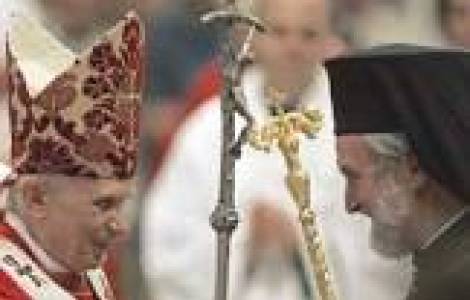
By Gianni Valente
Both Pope Francis and Pope Benedict XVI knew this. Both recognized that as we crossed the threshold of the Third Millennium since the birth of Christ, he was the greatest Christian theologian around, Ioannis Zizioulas, Orthodox Metropolitan of Pergamum and former member of the Synod of the Ecumenical Patriarchate of Constantinople.
On Friday, February 2, his soul left this world. Zizioulas passed away in a hospital in Athens due to respiratory complications also related to Covid-19 infection. Today, Saturday, February 4, his funeral will be held in the Greek capital.
Ioannis Zizioulas was 92, and his death leaves all those who suffer from divisions among the baptized more alone, and have for decades considered full communion the Church of Rome and the Orthodox Churches not as a sentimental dream, but as a possibility on the horizon. A beneficial and urgent "surrender to reality" on the part of "sister Churches" that amidst a thousand wounds and misunderstandings have all guarded the same treasure of the Sacraments and the validity of Apostolic succession.
Zizioulas' theology started precisely from the recognition that the entire reality and life of the Church has its source in the sacrament of the Eucharist, celebrated by the ecclesial community gathered around its Bishop. His "Eucharistic ecclesiology" drew substance from his penetrating reading of the Church Fathers and developed the insights of Orthodox theologians such as Russian Nicolay Afanasiev. For him, as for Afanasiev, "where there is the Eucharist, there is the Church". And every local Church is Church in the full sense, by virtue of the Eucharist celebrated by it according to the mandate given by Jesus to the apostles and their successors.
Ioannis Zizioulas was born in northern Greece. He had studied theology at the Universities of Thessaloniki and Athens and then attended the Ecumenical Institute of Bossey of the Ecumenical Council of Churches. After serving as a professor of church history and Patristics, he was a professor of Systematic Theology and Patristics at institutes and universities in the United Kingdom (Edinburgh, Glasgow, London).
In the early 1980s, the great Dominican theologian Yves Congar already called him "one of the most original and profound theologians of our time".
Precisely because of the inexhaustible richness of the sources of faith from which he drew his theology, Zizioulas also became a key figure in the theological dialogue initiated after the Second Vatican Council to remove doctrinal obstacles to the restoration of full communion between Catholics and Orthodox. In 1986, he was appointed Metropolitan of Pergamum within the Ecumenical Patriarchate of Constantinople, and his theological guidelines, since the 1990s, were the most prominent contribution to the attempt to find a point of consensus between Orthodox and Catholics on the doctrine of the Primacy and the role of the Bishop of Rome.
In the last years of John Paul II's pontificate and in those of Benedict XVI, Zizioulas was Co-Chairman of the Commission for Theological Dialogue between the Catholic Church and the Orthodox Churches. His theological arguments based on constant references to Tradition and Church history during those years made a crucial contribution to the search for a definition of the Pope's universal primacy that could also be accepted by the Orthodox.
For Zizioulas, even the Orthodox Churches, by looking at their own history and ancient canons, could come to recognize that the exercise of primacy at all levels, from local to universal, is part of the structure of the Church wanted by the Lord Jesus, and is not a matter of practical-canonical organization of ecclesial apparatuses and dynamics. "In the Orthodox tradition," Zizioulas explained in a 2005 interview with the Catholic magazine 30Days, "there has never been and cannot be a synod or council without a 'protos,' that is, a 'primus.' Therefore, if synodality is by divine right, so must primacy be by the same title."
In 2007, thanks in large part to Zizioulas' stimulating and objective theological formulations, the "Ravenna Document" was drawn up: in that document, produced by the Commission for Theological Dialogue, even the Orthodox acknowledged that primacy is necessary and firmly grounded in the canonical tradition of the Church, and is not merely a human "organizational" element. Consensus had also been reached between Catholic and Orthodox representatives in recognizing that there is always the exercise of primacy in the Church at the local, regional and universal levels. Then, everything got complicated and the auspicious moment faded after the Russian Orthodox Church refused to grant any kind of consent to the Ravenna document.
In more recent interviews, Metropolitan Ioannis had acknowledged that the quest to find new ways to recompose full communion between the Catholic Church and the Orthodox Churches had stalled, mainly because of the increasingly tearing intra-Orthodox divisions, made even more devastating after the clash between the Moscow Patriarchate and the Ecumenical Patriarchate of Constantinople over the canonical status of Orthodoxy in Ukraine.
"If the Church is closed in on herself, she will die. Because the Church exists for the world, not for itself," Ioannis Zizioulas repeated. For him, unity among the baptized "also serves to give a stronger common witness in the face of the problems that afflict the world and societies today." Now that the conflicts of history open unimaginable tears even between Churches that draw from the same spiritual source, Metropolitan Ioannis Zizioulas' wisdom of faith kindles the grateful memory of those who knew him. And it helps to cherish the hope of new beginnings and new beginnings, in the journey to witness in fullness the communion of those who bear the name of Christ. (Agenzia Fides, 4/2/2023)